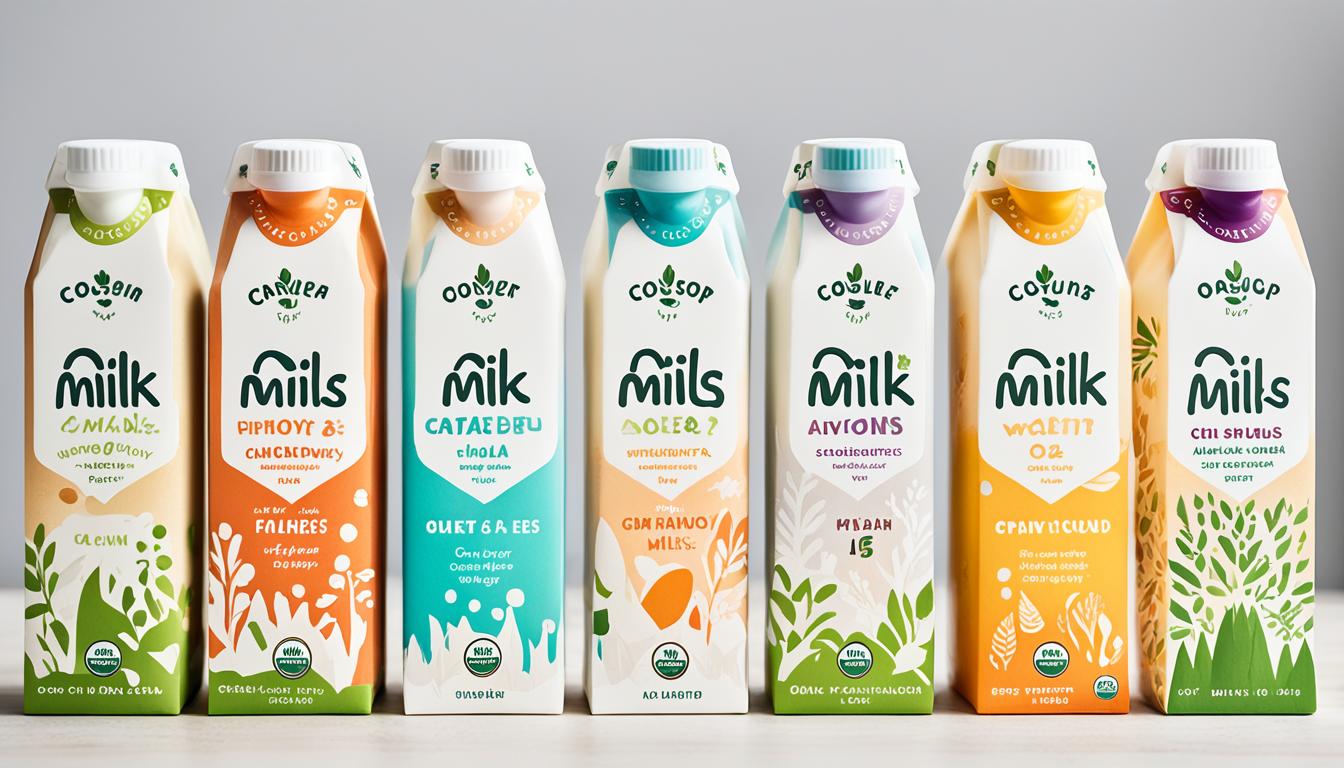Plant-based and alternative milks have become increasingly popular as consumers look for dairy alternatives. Whether due to allergies, lactose intolerance, dietary preferences, or environmental concerns, more and more people are opting for non-dairy milk options. These plant milk products offer a wide range of choices that cater to various needs and tastes.
Key Takeaways:
- Plant-based milks are gaining popularity as dairy alternatives.
- They offer a variety of options for individuals with allergies, intolerances, or dietary preferences.
- Plant-based milks can be more environmentally friendly compared to traditional dairy products.
- Non-dairy milks often include plant-based ingredients such as soy, almonds, oats, and hemp.
- These milk alternatives provide a range of nutritional profiles and flavors to suit different preferences.
Health Benefits of Plant-Based Milks
Plant-based milks, such as nut milks, oat milk, soy milk, and almond milk, offer a range of health benefits compared to traditional dairy milk alternatives. These vegan milk alternatives are lactose-free, making them suitable for individuals with lactose intolerance. Additionally, they are free from cholesterol and lower in calories, making them a healthier choice for those watching their weight.
Each type of plant-based milk has its own unique nutritional profile, providing different health advantages. For instance, soy milk is a great source of protein, making it an excellent option for individuals looking to increase their protein intake. On the other hand, almond milk is rich in vitamin E, a powerful antioxidant that promotes skin health and boosts the immune system.
These plant-based milks are often fortified with additional vitamins and minerals to enhance their nutritional value. They provide essential nutrients, such as calcium and vitamin D, which are typically found in dairy milk. This fortification helps individuals following a vegan or dairy-free diet meet their nutritional needs.
Furthermore, the variety of nut milks, oat milk, soy milk, and almond milk provide options for those with specific dietary preferences or needs. They offer a delicious alternative for individuals who choose to exclude animal products from their diet without compromising on taste or texture.
“Plant-based milks are not only a great lactose-free option for those with dietary restrictions, but they also offer a wide range of health benefits and nutritional value.” – Dr. Emily Carter, Nutrition Expert
Nutritional Comparison of Plant-Based Milks
| Plant-Based Milk | Protein (g) | Fat (g) | Carbohydrates (g) | Calcium (mg) | Vitamin E (mg) |
|---|---|---|---|---|---|
| Oat Milk | 1 | 2.5 | 14 | 120 | 0.2 |
| Soy Milk | 7 | 4 | 4 | 300 | 0.5 |
| Almond Milk | 1 | 2.5 | 1 | 450 | 2.5 |
Table: A nutritional comparison of popular plant-based milks.
As seen in the table above, each type of plant-based milk has its own unique nutritional composition. These variations allow individuals to choose the milk alternative that best suits their specific dietary requirements and taste preferences.
Overall, incorporating vegan milk alternatives, such as nut milks, oat milk, soy milk, and almond milk, into your diet can offer a wide range of health benefits. Whether you follow a vegan or dairy-free diet or simply want to explore new and nutritious options, plant-based milks provide a delicious and nutritious alternative to traditional dairy milk.
Types of Plant-Based Milks
There are various types of plant-based milks available on the market, providing a wide range of options for those seeking dairy alternatives. Whether you’re lactose intolerant, following a vegan diet, or simply exploring new flavors, plant-based milks offer a delicious and nutritious alternative to cow’s milk. Let’s take a closer look at some popular plant-based milk options:
Oat Milk
 Oat milk has been gaining popularity for its potential therapeutic benefits and high nutritive value. Made by blending oats with water and straining the mixture, oat milk has a creamy texture and a naturally sweet flavor. It’s also rich in beta-glucans, a type of soluble fiber that may help reduce cholesterol levels and promote heart health.
Oat milk has been gaining popularity for its potential therapeutic benefits and high nutritive value. Made by blending oats with water and straining the mixture, oat milk has a creamy texture and a naturally sweet flavor. It’s also rich in beta-glucans, a type of soluble fiber that may help reduce cholesterol levels and promote heart health.
Soy Milk
Soy milk has been consumed for thousands of years and is known for its balanced nutritional profile. Made from soybeans and water, soy milk is a good source of protein, essential amino acids, and phytonutrients. It’s a versatile plant-based milk that can be used in various recipes, from smoothies and coffee to baking and cooking.
Almond Milk
Almond milk is a popular choice for its mild flavor and lower calorie content. Made by blending almonds with water and straining the mixture, almond milk has a delicate nutty taste. It’s also a good source of vitamin E, an antioxidant that helps protect cells from damage.
Hemp Milk
Hemp milk is made from whole hemp seeds blended with water. It’s known for its rich, creamy texture and earthy flavor. Hemp milk is a great source of omega-3 fatty acids, which are beneficial for heart and brain health. It’s also packed with vitamins and minerals, including calcium and vitamin D.
Rice Milk
Rice milk is a dairy alternative that’s often used by individuals with nut, dairy, or soy sensitivities. Made from milled rice blended with water, rice milk has a mild and slightly sweet flavor. It’s naturally lactose-free and low in fat, making it a suitable choice for those with dietary restrictions.
Each type of plant-based milk offers a unique taste and nutritional profile. Whether you prefer creamy oat milk, protein-rich soy milk, or the delicate flavor of almond milk, there’s a plant-based milk option to suit your preferences and dietary needs.
Environmental and Ethical Considerations
Choosing plant-based milks can have significant environmental and ethical benefits. The dairy industry is associated with various environmental concerns, including land use, deforestation, and climate change. Cattle farming requires large amounts of land and water, contributing to habitat loss and water scarcity. Additionally, cows produce methane, a potent greenhouse gas that contributes to global warming.
By opting for plant-based milks, individuals can reduce their ecological footprint and contribute to more sustainable food choices. Plant-based milks have a lower carbon footprint and water usage compared to traditional dairy milk production. For example, almond milk production requires significantly less water compared to cow’s milk production.
Furthermore, plant-based milks offer an ethical alternative to dairy milk. The dairy industry is often associated with ethical concerns related to animal welfare. The separation of calves from their mothers and the mistreatment of dairy cows are common practices in the industry.
Choosing plant-based milks aligns with the principles of plant-based diets, which advocate for the reduction or elimination of animal products in favor of plant-based alternatives. Plant-based diets have gained popularity due to their potential health benefits and lower environmental impact. By consuming plant-based milks, individuals can contribute to a more sustainable and ethical food system.
To illustrate the environmental impact of plant-based milks compared to dairy milk, the table below provides a comparison of land use, water consumption, and greenhouse gas emissions for different milk types.
| Milk Type | Land Use (m² per liter) | Water Consumption (liters per liter) | Greenhouse Gas Emissions (kg CO2e per liter) |
|---|---|---|---|
| Dairy Milk | 2.5 | 1050 | 2.7 |
| Soy Milk | 0.07 | 297 | 0.41 |
| Almond Milk | 0.12 | 74 | 0.38 |
| Oat Milk | 0.13 | 48 | 0.33 |
As shown in the table, plant-based milks have a significantly lower environmental impact compared to dairy milk. They require less land, water, and produce fewer greenhouse gas emissions.
By considering environmental and ethical concerns, individuals can make informed choices that support sustainability and animal welfare. Switching to plant-based milks is a small but impactful step towards creating a more sustainable and compassionate food system.
Conclusion
Plant-based milks have emerged as a popular choice in the beverage industry, offering a wide range of dairy milk alternatives that not only cater to individuals with specific dietary requirements but also provide numerous health benefits and contribute to a healthier planet. These plant-based milks are an excellent option for those with lactose intolerance, cow milk allergies, or those following vegan or dairy-free diets. They provide unique flavors and nutritional profiles, with some even fortified with additional vitamins and minerals.
By opting for plant-based milks, consumers can make choices that are not only beneficial for their own health but also have a positive impact on the environment and animal welfare. The production of traditional cow’s milk has a significant environmental footprint, with concerns related to land use, deforestation, and greenhouse gas emissions. In contrast, plant-based milks have a lower environmental impact, requiring fewer resources and emitting fewer greenhouse gases.
As the demand for plant-based milks continues to surge, we can expect to see more research and innovation in this field. This will lead to further improvements in taste, texture, and nutritional profiles of plant-based milk alternatives. The growing availability and diversity of options will provide consumers with even more choices to suit their preferences and dietary needs. The switch to plant-based milks is not just a passing trend; it represents a shift towards a more sustainable and ethical food system.
FAQ
What are plant-based and alternative milks?
Plant-based or alternative milks are non-dairy beverages made from plants, such as nuts, grains, or legumes, that serve as substitutes for traditional cow’s milk.
Why do people choose plant-based milks?
People choose plant-based milks for various reasons, including cow milk allergies, lactose intolerance, calorie concerns, and a preference for vegan diets.
What health benefits do plant-based milks offer?
Plant-based milks are lactose-free, cholesterol-free, and lower in calories compared to cow’s milk. They also have their own unique nutritional profiles and can be fortified with additional vitamins and minerals.
What are some popular types of plant-based milks?
Some popular types of plant-based milks include oat milk, soy milk, almond milk, hemp milk, and rice milk.
Are there environmental and ethical considerations when choosing plant-based milks?
Yes, choosing plant-based milks can have environmental benefits by reducing land use, deforestation, and greenhouse gas emissions associated with the dairy industry. Additionally, plant-based milks offer a cruelty-free alternative that aligns with plant-based diets and promotes a more sustainable and ethical food system.




